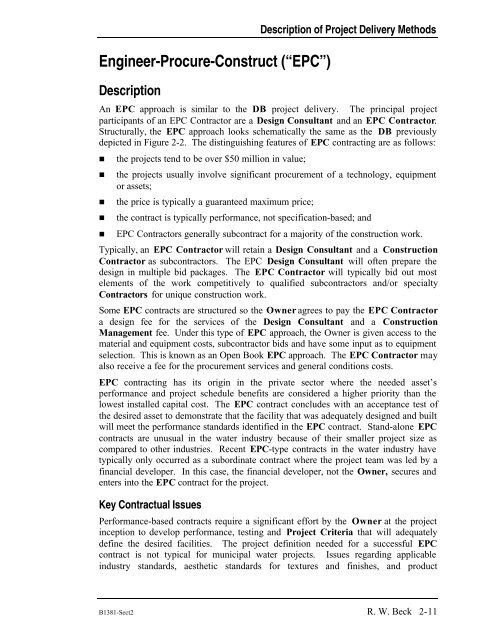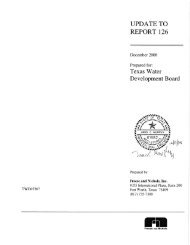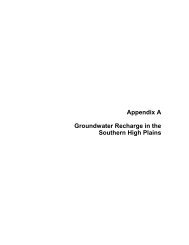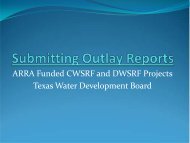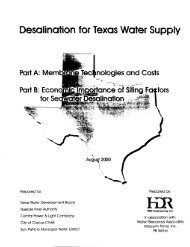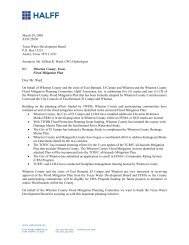Alternative Project Delivery - Texas Water Development Board
Alternative Project Delivery - Texas Water Development Board
Alternative Project Delivery - Texas Water Development Board
You also want an ePaper? Increase the reach of your titles
YUMPU automatically turns print PDFs into web optimized ePapers that Google loves.
Engineer-Procure-Construct (“EPC”)<br />
Description<br />
Description of <strong>Project</strong> <strong>Delivery</strong> Methods<br />
An EPC approach is similar to the DB project delivery. The principal project<br />
participants of an EPC Contractor are a Design Consultant and an EPC Contractor.<br />
Structurally, the EPC approach looks schematically the same as the DB previously<br />
depicted in Figure 2-2. The distinguishing features of EPC contracting are as follows:<br />
• the projects tend to be over $50 million in value;<br />
• the projects usually involve significant procurement of a technology, equipment<br />
or assets;<br />
• the price is typically a guaranteed maximum price;<br />
• the contract is typically performance, not specification-based; and<br />
• EPC Contractors generally subcontract for a majority of the construction work.<br />
Typically, an EPC Contractor will retain a Design Consultant and a Construction<br />
Contractor as subcontractors. The EPC Design Consultant will often prepare the<br />
design in multiple bid packages. The EPC Contractor will typically bid out most<br />
elements of the work competitively to qualified subcontractors and/or specialty<br />
Contractors for unique construction work.<br />
Some EPC contracts are structured so the Owner agrees to pay the EPC Contractor<br />
a design fee for the services of the Design Consultant and a Construction<br />
Management fee. Under this type of EPC approach, the Owner is given access to the<br />
material and equipment costs, subcontractor bids and have some input as to equipment<br />
selection. This is known as an Open Book EPC approach. The EPC Contractor may<br />
also receive a fee for the procurement services and general conditions costs.<br />
EPC contracting has its origin in the private sector where the needed asset’s<br />
performance and project schedule benefits are considered a higher priority than the<br />
lowest installed capital cost. The EPC contract concludes with an acceptance test of<br />
the desired asset to demonstrate that the facility that was adequately designed and built<br />
will meet the performance standards identified in the EPC contract. Stand-alone EPC<br />
contracts are unusual in the water industry because of their smaller project size as<br />
compared to other industries. Recent EPC-type contracts in the water industry have<br />
typically only occurred as a subordinate contract where the project team was led by a<br />
financial developer. In this case, the financial developer, not the Owner, secures and<br />
enters into the EPC contract for the project.<br />
Key Contractual Issues<br />
Performance-based contracts require a significant effort by the Owner at the project<br />
inception to develop performance, testing and <strong>Project</strong> Criteria that will adequately<br />
define the desired facilities. The project definition needed for a successful EPC<br />
contract is not typical for municipal water projects. Issues regarding applicable<br />
industry standards, aesthetic standards for textures and finishes, and product<br />
B1381-Sect2 R. W. Beck 2-11


